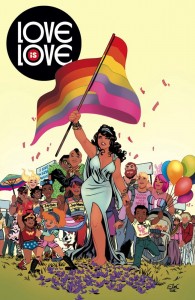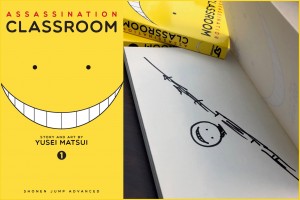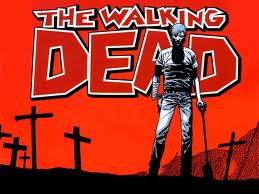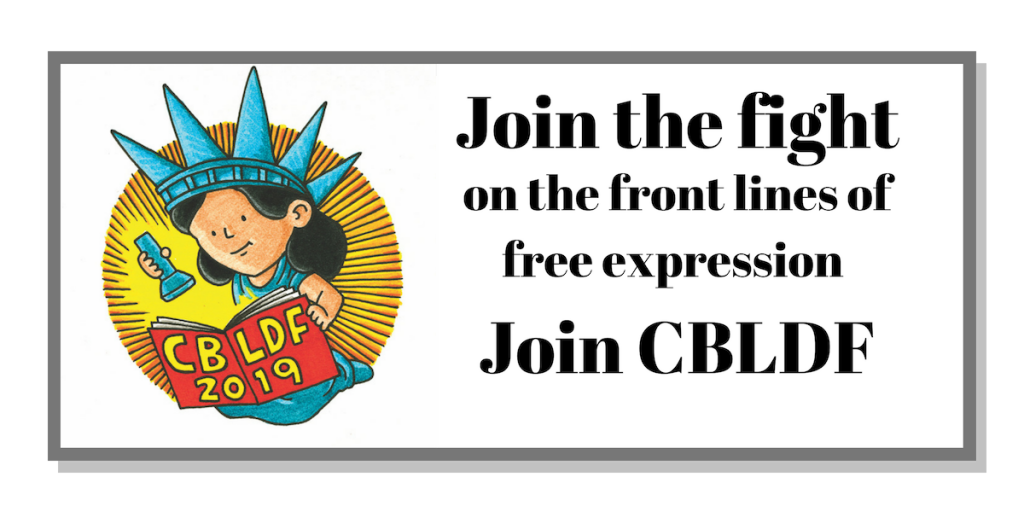Trying to decide which prompt to start with in CBLDF’s Read (Something) More 2020 Challenge? Here’s 12 Banned and Challenged comics to choose from. Or pick one a month to better familiarize yourself with the titles and creators on the front lines of free expression! Stop and ask your local library if they have them already or if you can get them through inter-library loan, or develop a relationship with your local comics shop, and open up a dialogue about the importance of the freedom to read!
If you do pick one for the 2020 Reading Challenge, tag us in what you’re reading and use the hashtag #CBLDF24. If you have any questions, ask us on Instagram, Twitter, or Facebook.
Batman: The Killing Joke 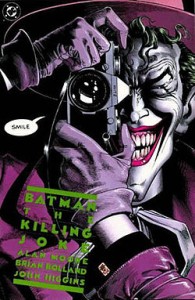
Alan Moore and Brian Bolland (DC Comics, 1988)
Batman: The Killing Joke depicts Joker’s violent torture of Jim Gordon and his daughter Barbara. It had a profound influence on the Batman universe’s continuity, introducing Barbara Gordon’s shooting and subsequent paralysis and opening the door to her transition into the character Oracle.
In May 2013, a patron of the public library in Columbus, Nebraska, requested that the book be removed from the collection, claiming that it “advocates rape and violence.” Three out of five library board members were present at the meeting during which the challenge was considered, and they voted unanimously to retain The Killing Joke on shelves.
Love is Love
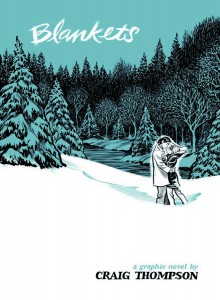
Blankets
Craig Thompson (Top Shelf, 2003)
In 2006, Craig Thompson’s celebrated graphic novel Blankets was challenged in the Marshall, Missouri, Public Library. Blankets is the semi-autobiographical story of Thompson’s upbringing in a religious family, his first love, and how he came to terms with his religious beliefs. The primary narrative in the book describes the main character Craig’s relationship with Raina, a young woman he meets at a Christian youth camp. We get glimpses into Craig’s childhood and his relationship with his younger brother through flashbacks, as he wrestles with his views of religion and his relationship with God.
Lumberjanes: The Infernal Compass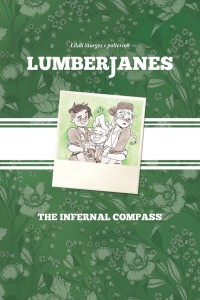
Lilah Sturges and polterink (BOOM! Studios, 2018)
In summer 2019, an event with author and transgender rights advocate Lilah Sturges was canceled just two hours before she was scheduled to talk about Lumberjanes: The Infernal Compass at Leander Public Library in Texas. The city gave inadequate reasons, claiming temporary changes to library event policies, as well as the lack of a previously undiscussed background check. CBLDF led an immediate effort to reverse the cancelation, which a local news outlet confirmed is likely an act of discrimination against Sturges and the LGBTQ+ community. This is the second recent incident of identity censorship in Leander, following a June ban on Drag Queen Story Hour. This case is ongoing.
The Walking Dead
Robert Kirkman and Charlie Adlard (Image Comics, 2003)
At the end of the 2019 school year, the Wallace School District in Silverton, Idaho, banned The Walking Dead over concerns about “graphic imagery.” A former teacher opened an investigation into the series, and a review committee was formed to examine the books. The committee voted to retain the series, but an administrator overruled the decision and unilaterally removed the books from school shelves. Students are also restricted from bringing personal copies of the series onto campus, and the district is contemplating a system to prohibit students from accessing it through interlibrary loan. CBLDF is currently fighting the ban.
Pride of Baghdad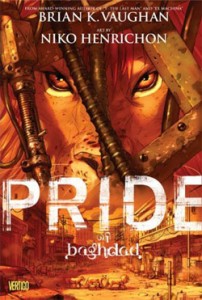
Brian K. Vaughan and Niko Henrichon (DC Comics, 2006)
Pride of Baghdad, a graphic novel that follows a pride of lions that escapes from a Baghdad zoo after an American bombing, is based loosely on true events. Despite making both YALSA’s Great Graphic Novels for Teens Top Ten in 2007 and Booklist Editors’ Choice: Adult Books for Young Adults, as well as featuring non-human main characters, Pride of Baghdad is frequently challenged for sexual content. Despite challenges, the book remains available in libraries around the country. It is often praised for the ways in which it addresses the effects of war on civilians and its commentary on freedom.
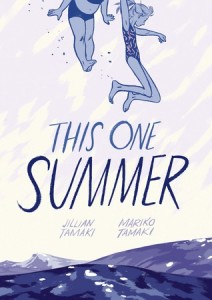 This One Summer
This One Summer
Jillian Tamaki and Mariko Tamaki (First Second, 2014)
This One Summer broke boundaries by becoming the first graphic novel to make the shortlist for the Caldecott Medal. Unfortunately, the Caldecott honor yielded an unforeseen negative outcome: increased calls to ban the book.
This One Summer addresses the challenges of adolescence in a sensitive and nuanced storyline that has achieved wide acclaim. It was named the most challenged book of 2016, the seventh most challenged title of 2018, and it has been among CBLDF’s most frequently defended titles.
Palomar (Love & Rockets)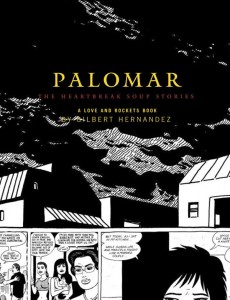
Gilbert Hernandez (Fantagraphics, 2003)
In early 2015, the critically acclaimed comic collection Palomar by Gilbert Hernandez was called “child porn” by the mother of a high school student in Rio Rancho, New Mexico. Needless to say, Palomar is not actually a collection of child porn—Publishers Weekly called it “a superb introduction to the work of an extraordinary, eccentric and very literary
cartoonist,” and it often draws comparisons to the magic realism of novelists such as Gabriel Garcia Marquez.
CBLDF took immediate action to help defend the book, leading a review committee to agree to retain the book by a 5–3 vote. Although Palomar was slated to return to shelves, someone within the district has imposed a requirement that students under 18 must have parental permission to access it.
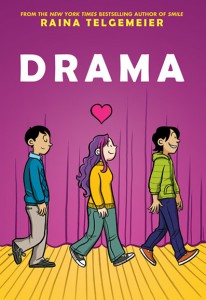 Drama
Drama
Raina Telgemeier (Scholastic / Graphix, 2012)
Raina Telgemeier’s Drama, a graphic novel about the joys and tribulations of a middle school drama troupe, received universal critical praise upon its publication in 2012. Although most readers found Drama to be just as endearing and authentic as Telgemeier’s previous books, Smile, and Sisters, a small but vocal minority have objected to the inclusion of two gay characters, one of whom shares a chaste on-stage kiss with another boy.
The book was listed among the country’s top ten most banned books in 2014, 2016, 2017, and 2018. Raina Telgemeir’s newest book Guts, was released as the top-selling book int he country according to The New York Times, so if you’ve already done this amazing all-ages graphic novel, consider picking up her newest one.
Mangaman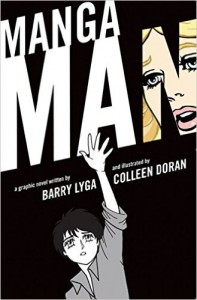
Barry Lyga and Colleen Doran (HMH Books for Young Readers, 2011)
Mangaman tells the story of Ryoko, a manga character who falls through a dimensional rift into a real-world American high school. Ryoko has trouble fitting in at his new school because he involuntarily brought with him various manga conventions: heart eyes when he develops a crush on the beautiful Marissa Montaigne, speed lines when he moves quickly, and perhaps most embarrassing of all, pixelated genitals. On the page that led to the book’s challenge, the nude Ryoko sheepishly cites Article 175 of Japan’s Criminal Code to assure Marissa that “it’s there, you just can’t see it.” In the next few panels, both Ryoko and Marissa admit with relief that they are not yet ready to have sex anyway. The book was ultimately retained after passing through a review committee, public forum, and the school board.
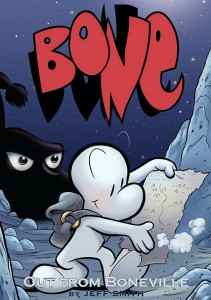 Bone
Bone
Jeff Smith (Scholastic / Graphix, 2005)
Jeff Smith’s Bone follows Fone Bone and his two cousins Smiley and Phoney on adventures that are humorous, mythical, and epic in scope. Although considered a modern comics classic that has delighted millions of readers all over the world, Bone is also one of the most commonly challenged books in American libraries. According to ALA’s Office for Intellectual Freedom, the Bone series has faced several challenges and at least one ban over the years. In 2013, it was the tenth most banned book in the country.
Watchmen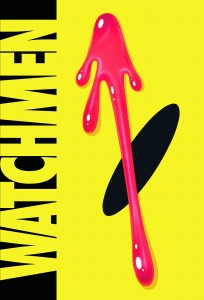
Alan Moore and Dave Gibbons (DC Comics, 1987)
The graphic novel that changed everything about superheroes is also one of the most frequently banned comics! Alan Moore and Dave Gibbons’ Watchmen has been praised by critics and fans alike since its 1986 debut. The alternate history reimagines the superhero genre, employing political allegory, adult themes, and unprecedented formal inventiveness in a murder mystery involving flawed heroes.
Watchmen won the Hugo Award in 1988 and has been instrumental in garnering more respect and shelf space for comics and graphic novels in libraries and mainstream bookstores. The same qualities that led to Watchmen’s massive acclaim also led to its challenge in school library collections. As HBO prepares to center a new epic TV show in the Watchmen universe, it is sure to resurface some censors interest, as teachers and librarians use the original text to increase engagement with the graphic novel that started it all.
